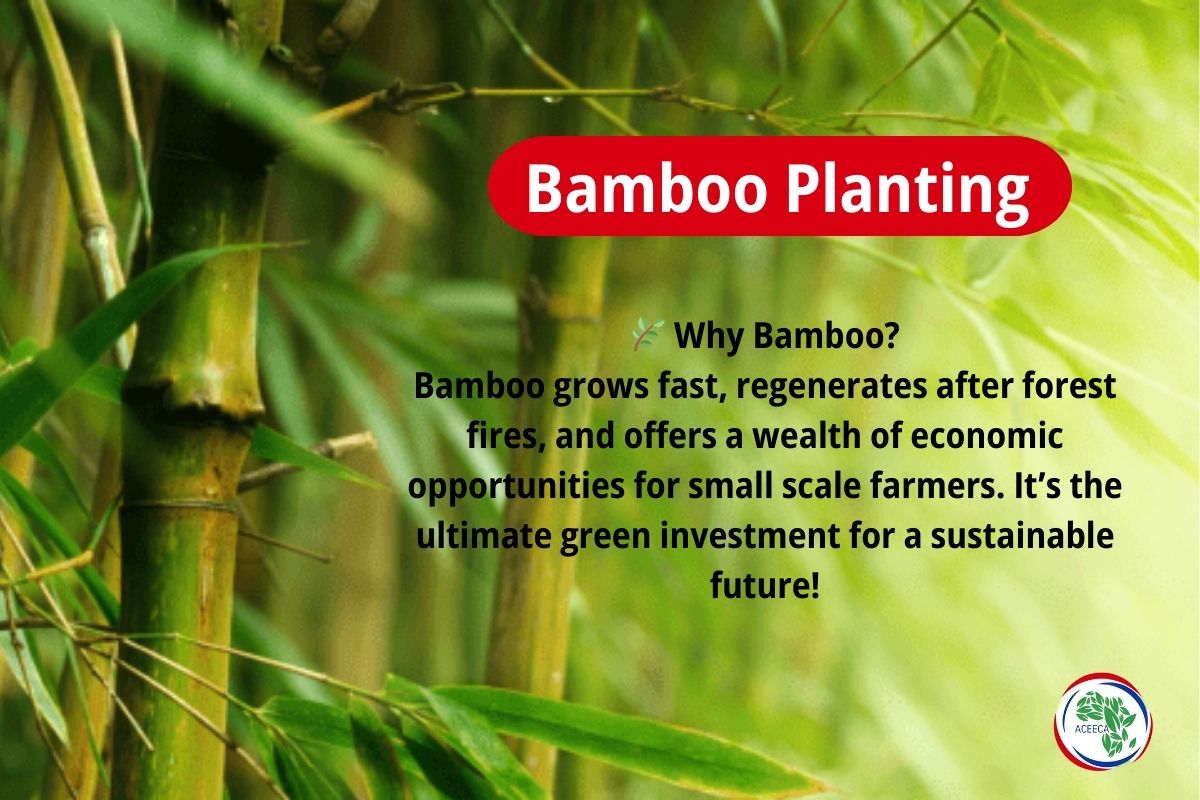African Centre For Environment, Energy and Climate Advocacy

Bamboo Planting for Environmental sustainability and Livelihoods
Background and Rationale
Kenya’s landscapes are facing a growing threat from deforestation, soil erosion, and diminishing water resources. These challenges not only harm the environment but also jeopardize the livelihoods of local communities who depend on fertile land and reliable water sources.
Bamboo, a fast-growing and highly adaptable plant, offers a sustainable solution. Its deep root system helps stabilize riverbanks, preventing soil erosion, while its ability to retain water benefits nearby farmlands. Bamboo’s remarkable resilience—regenerating quickly even after forest fires—makes it an invaluable resource for environmental restoration. Beyond its ecological value, bamboo opens up diverse economic opportunities for farmers, from crafting furniture to producing paper and creating eco-friendly products.
This project is deeply rooted in ACEECA’s commitment to environmental stewardship, renewable energy solutions, and building climate-resilient communities.
Project Goals and Objectives
Goal:
To promote environmental conservation and improve community livelihoods through bamboo planting.
Objectives:
- Plant bamboo along riverbanks and in water catchment areas to reduce soil erosion and retain water.
- Work with farmers to allocate at least 10% of their land for bamboo planting.
- Raise awareness on the environmental and economic benefits of bamboo planting.
- Train farmers on sustainable bamboo management and value addition for profit.
Target Group
- Smallholder farmers living near rivers and water catchment areas.
- Communities relying on these catchments for water and agricultural activities.
- Youth and women’s groups seeking economic opportunities in bamboo-based enterprises.
Key Activities
- Community Awareness and Education: Organize interactive workshops and community meetings to highlight the ecological and economic value of bamboo.
- Bamboo Planting and Management: Distribute high-quality bamboo seedlings to farmers and community organizations; Offer hands-on guidance and technical support to ensure successful planting and growth.
- Building a Bamboo Value Chain: Train farmers to process bamboo into products like poles, charcoal, and paper; Facilitate workshops on sustainable harvesting and marketing strategies to maximize profits.
- Strategic Partnerships: Collaborate with government agencies, NGOs, and private organizations to mobilize resources and technical expertise.
Benefits to Farmers
For farmers, bamboo is more than a plant; it’s a pathway to better livelihoods. By participating in this project, they’ll gain:
- Farmland protection: Bamboo stabilizes soil, preventing erosion that threatens agricultural productivity.
- Improved water access: Bamboo enhances water retention, benefiting crops and reducing irrigation needs.
- A renewable income source: Farmers can harvest bamboo sustainably and explore new markets for value-added products like furniture, crafts, and paper.
Long-term environmental and Economic impact
The project envisions a future where:
- Degraded riverbanks are restored, and forest cover increases, reducing the impacts of deforestation.
- Water quality and availability improve, benefiting both ecosystems and local communities.
- Farmers and their families achieve financial stability through sustainable bamboo-based ventures.
Monitoring and Evaluation
To ensure the project stays on track and delivers meaningful results, we will:
- Conduct regular site visits to assess bamboo growth and survival rates.
- Collect data to measure changes in soil stability and water retention.
- Evaluate the social and economic impact on participating farmers through surveys and interviews.